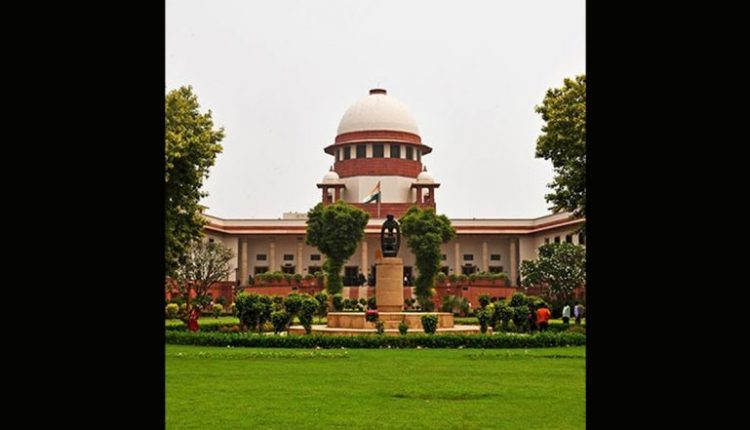Same-Sex Marriage Judgment: Supreme Court To Hear on November 28 Review Petition Against Top Court’s Verdict Declining Marriage Equality Right to Queer Couples
New Delhi, November 23: The Supreme Court will hear on November 28 the review petition against the top court’s judgement declining marriage equality rights to queer couples. Senior Advocate Mukul Rohatgi, appearing for the petitioner, mentioned the review petition before a bench headed by Chief Justice of India DY Chandrachud.
The senior advocate pressed for an open court hearing on the review petition and apprised the court that all judges have agreed that there is discrimination; therefore, he urged that there has to be a remedy. He also apprised the court that the matter is to be listed on Nov 28 and sought not to be deleted. The court said that it has not gone through the petitions yet and they will look into it and decide. Same-Sex Marriage Judgment: Supreme Court Refuses to Give Marriage Equality Right to LGBTQIA+ Community, Says Verdict Won’t Preclude Queer People From Entering Into Relationship.
Various review petitions have been filed in the Supreme Court challenging the top court judgement, which declined marriage equality rights to queer couples. One of the review petitions has been filed through advocates Karuna Nundy and Ruchira Goel, which sought to review the majority judgement dated October 17, passed by the top court, which rejected a batch of petitions seeking legal recognition of same-sex and queer marriage under the Special Marriage Act, 1954 (SMA), Foreign Marriage Act, 1969 (FMA), Citizenship Act, 1955, the common law and other existing legislation.
The top court delivered four separate judgements dated October 17. The majority judgement was delivered by justices SR Bhat, Hima Kohli and PS Narasimha. Chief Justice of India DY Chandrachud and Justice SK Kaul have delivered minority judgements.
The majority judgement held that there is no fundamental right to marry; transgender persons have the right to heterosexual marriage under the existing provisions of the Transgender Persons (Protection of Rights) Act, 2019 and the Transgender Persons (Protection of Rights) Rules, 2020; an entitlement to legal recognition of the right to union–akin to marriage or civil union–or conferring legal status upon the parties to the relationship can be only through enacted law and the court cannot enjoin or direct the creation of such a regulatory framework resulting in legal status. The majority judgement also denied to give any adoption rights to queer couples as it held that Regulation 5(3) of the CARA Regulations cannot be held void. Same-Sex Marriage: Review Petition Filed in Supreme Court Over Verdict on Plea Seeking Marriage Equality for Same-Sex Couples.
The Petitioners sought a review of the Majority judgement, calling it that it suffers from errors of law, application of law contrary to established principles, and commits a grave miscarriage of justice. “The majority judgement erroneously holds that the issue of “whether the absence of law or a regulatory framework, or the failure of the state to enact law, amounts to discrimination that is protected against under Article 15″ was not argued or urged by the petitioners,” read the petition.
“The majority judgement has erroneously failed to consider that the petitioner’s prayers do not seek the creation of a new institution of marriage for the petitioners, but only to extend the existing legal institution of marriage and consequent benefits to the petitioners. However, this is re-framing the right sought by the petitioners as a right to the creation of a new institution, which was not sought,” the petition said.
“The Majority Judgement erroneously refuses to find Regulation 5(3) of the Adoption Regulations, 2022 unconstitutional, finding that the law treats children of married couples and unmarried couples differently. However, this is contrary to established principles of law because, as noted by Chandrachud, CJ, in his dissenting opinion, the law offers no protection to a child adopted by a married couple that it does not offer to a child adopted by an unmarried couple,” read the plea.
The petition said that the operation of the majority judgement has grave consequences for the lives and relationships that the petitioners have built together, which remain outside the protection of the law. The dangers of the discrimination that have been recognised in all four opinions in the impugned judgements is the reality of the petitioners until they are recognised to be equal and on par with heterosexual couples, the petition further added.
Indeed, the petitioners in the captioned petitions also have children who are also without this equal recognition of their family. On this basis, the errors in the majority judgement constitute a sweeping miscarriage of justice, warranting urgent scrutiny by the top court in exercise of its review powers, the petition urged.
Beside seeking to set aside the earlier top court’s order, the petition sought to consider the remedies under Sections 15-18 of the Special Marriage Act, 1954. The petition said that reading the provisions under Sections 15-18 for the solemnization of “marriages celebrated in other forms” to be made available for non-heterosexual marriages, which may, in turn, be permitted to evolve through common law, prevents an exercise of “reading in/down” any provision of the SMA and gives effect to the top Court’s recognition of the constitutional rights of non-heterosexual and queer marriages.
(This is an unedited and auto-generated story from Syndicated News feed, Today News 24 Staff may not have modified or edited the content body)


